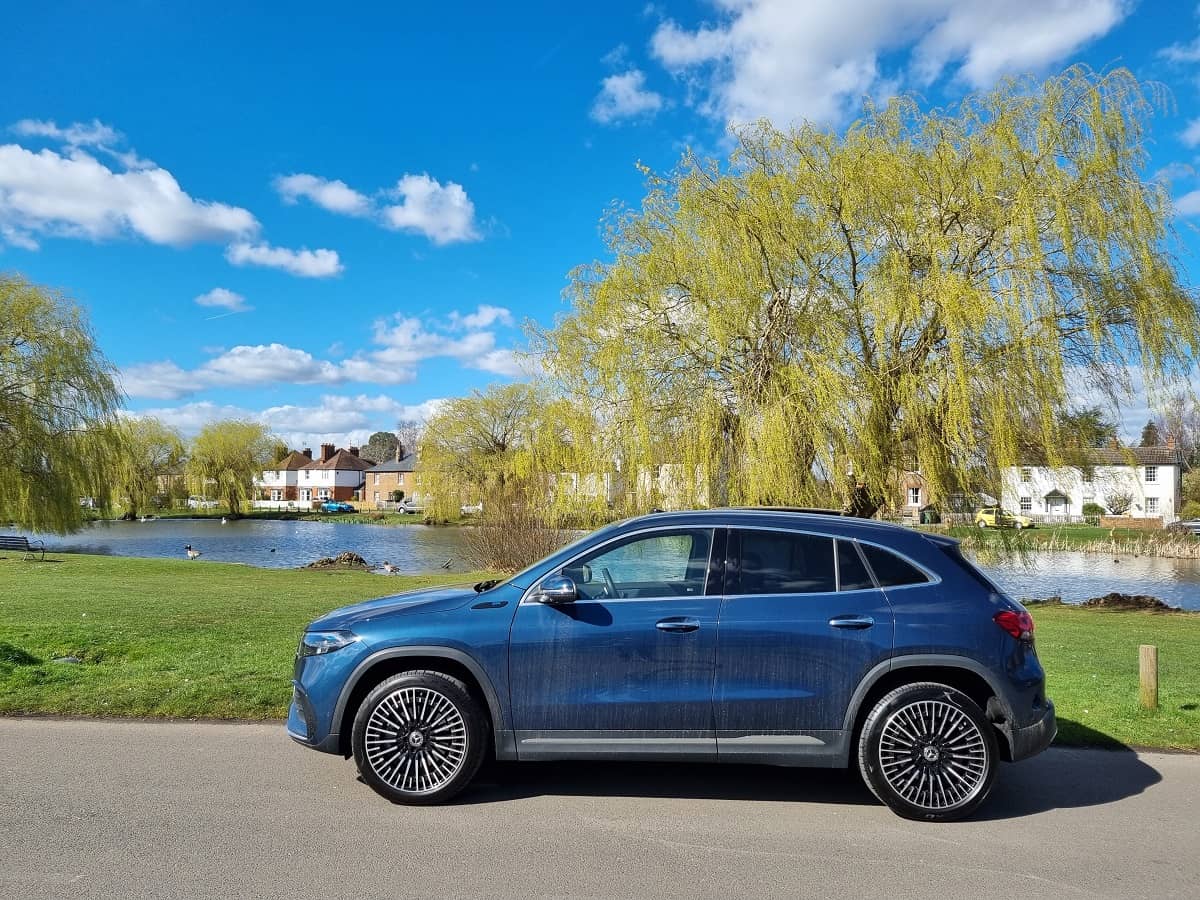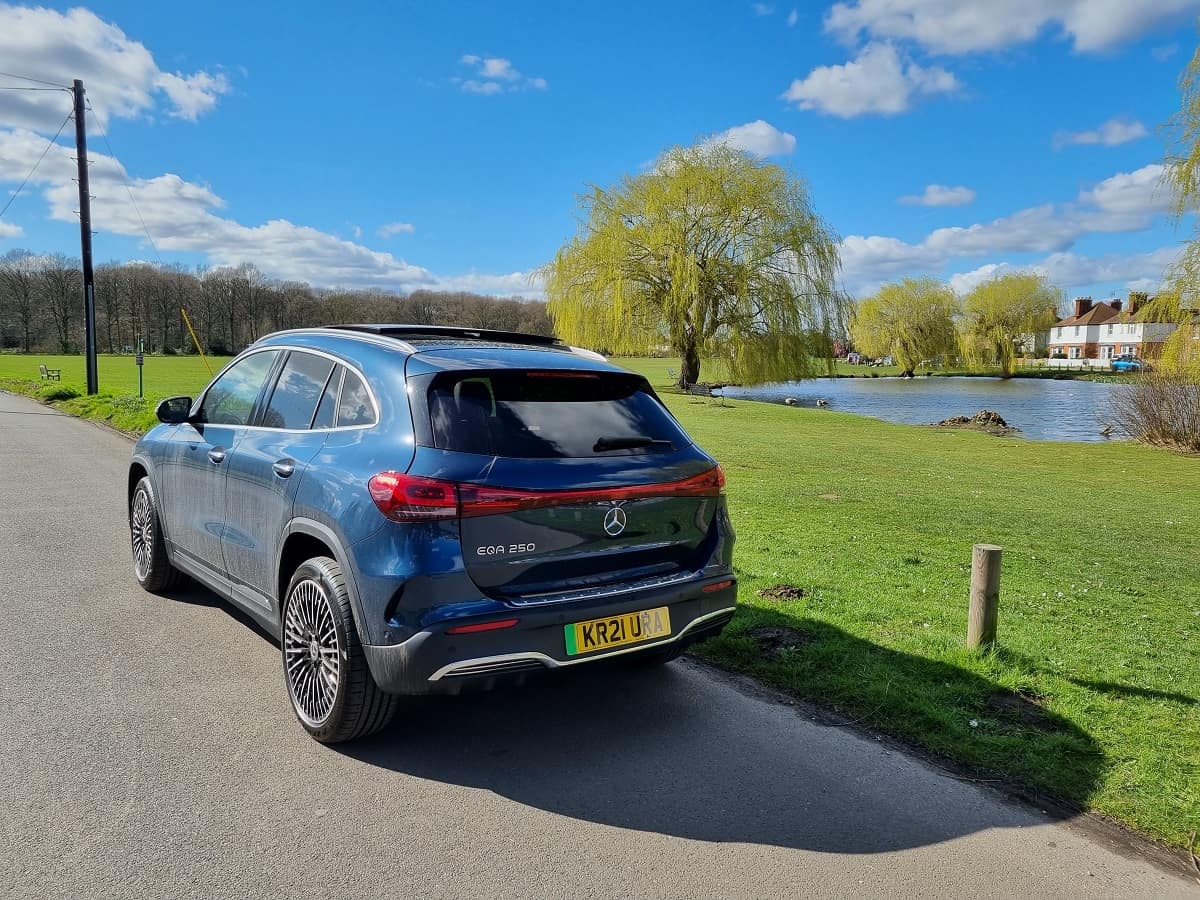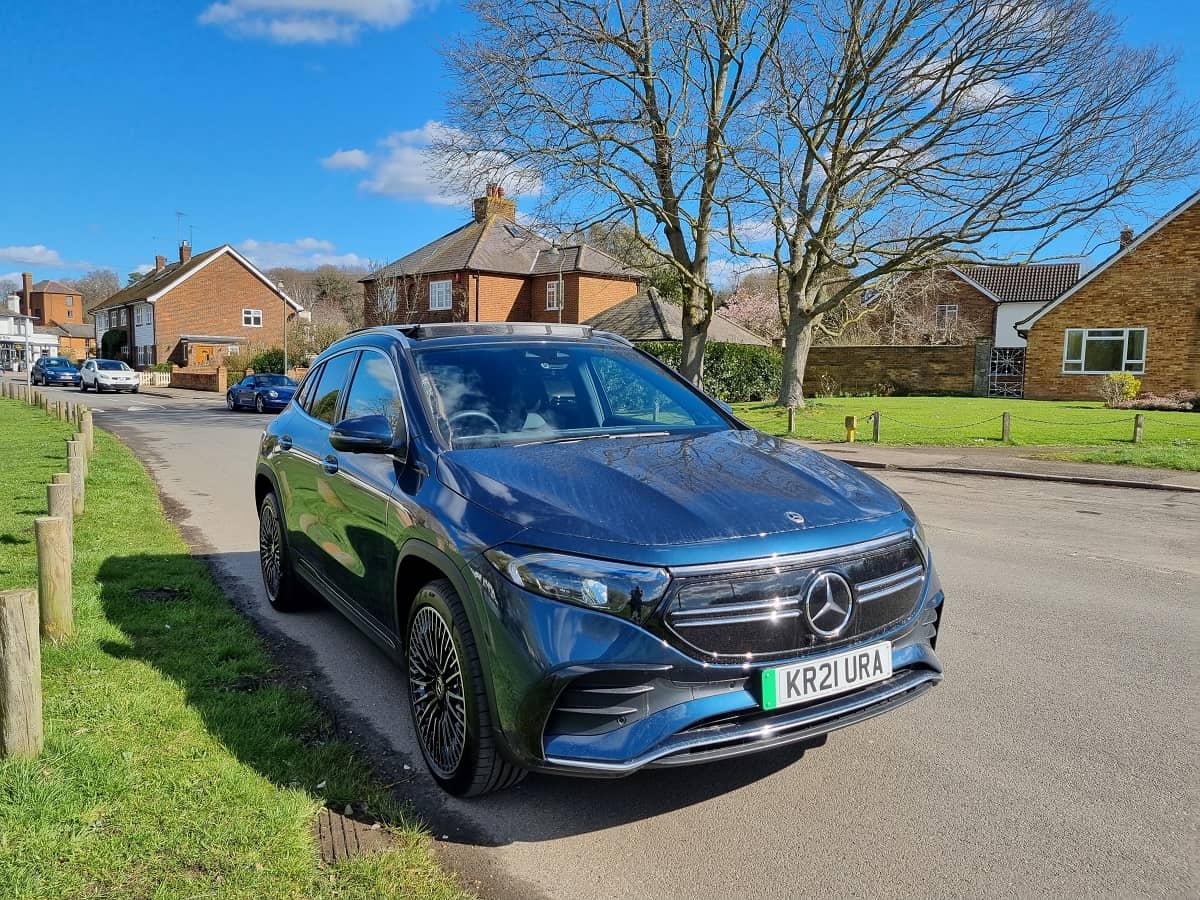Such has been the rush to compete on the electric vehicle (EV) scene that it has become something of an arms race. With an instant hit of torque, 0-60mph times have come tumbling down to supercar speeds at family prices. Yet there’s more to a car than how quick it moves away from the lights. Life in the fast lane is all well and good, but for some, the slow lane is the route of preference. It’s a demand some of the traditional car marques are catering for. Enter the Mercedes EQA.
Based upon the GLA, the Mercedes EQA, in short, substitutes the combustion engine for a 66.5kWh battery. So, can this transfer work? On paper, there are some questions. The available boot space is 150-litres fewer than the GLA. The rear seats are lower to the floor to accommodate the battery, meaning that rear passengers find their knees closer to their ears. It feels like a small car, but then you look at it. It’s massive.
The other glaring problem is the availability of the GLA. Running it through the Mercedes configurator, a Mercedes GLA 200 d AMG Line Premium Plus with the same extras as the model tested comes in at £43,800. The Mercedes EQA 250 AMG Line Premium Plus, as tested here, costs £54,085. That’s quite the jump in cost from ICE to EV. Batteries aren’t cheap.
So, can the Mercedes EQA justify the compromises for the extra money?
Living with the Mercedes EQA
The first thing to note is how well presented this car is. The bespoke 20” wheels really suit the car. In entry level Sport trim it rides on 18” wheels and they’d look a bit lost in these wheel arches. It’s a good looking car, in the most understated of ways. It blends in seamlessly wherever you go; an everyman car.

The understatement carries over to the driving experience, too. With a 0-60mph time of 8.9secs, it doesn’t encourage much in the way of hooliganism, being always polite and amenable. You can simply sit back and enjoy the interior.
The interior, without doubt, is the USP of the Mercedes EQA. It’s really well finished, with great quality materials and clever technology. The seats are comfortable and adjustable, and the screens are easy to navigate and access. There’s a good mix of touchscreen and physical buttons. All menus can be accessed via the steering wheel, too. I don’t usually like a cluttered steering wheel, but the functionality fitted to the Mercedes EQA’s wheel is brilliantly judged.
Diving into the infotainment menus is intuitive and simple to navigate. As ever, it’s worth taking time to familiarise yourself with the various menus and sub-menus, but it didn’t take long to get to grips with.
The sweeping screen, which appears to run from the infotainment system right across the driver’s dashboard, strikes the right balance between the modern and the traditional, supplemented as it is with an array of physical buttons.
At night, the Mercedes EQA is a thoroughly relaxed place to be. The ambient lighting can be set to your liking and fits in with the calm demeanour of the car. Sit back, get the Burmester sound system humming and let the miles tick by. There’s something quite mindful about it all.
What’s the Mercedes EQA like to drive?
The mindfulness extends to the driving experience, too. As mentioned, it’s not a traffic light racer. Add to that a kerb weight over two-tons and the Mercedes EQA doesn’t demand to be flung along a B-road, either. Leaning on it into bends quickly reveals a fish out of water.
That’s not to say it’s unenjoyable down a country road, though. You just need to recalibrate your demands of such an environment. On a sunny day, open the panoramic roof and let the world come to you. Along roads in which I have driven recently, I was approaching them from a different perspective. Rather than enjoying the dynamics of the car, I was enjoying the dynamics of my surroundings. I noticed things I hadn’t noticed previously. It was nice.

I would usually bemoan the lack of feedback in a steering setup, but in the Mercedes EQA it’s fine. The steering is light and silky smooth, very much in keeping with the rest of the car.
There are different driving modes to choose from, efficient, comfort and sport, but I just left it in comfort. That feels most appropriate and best suited to the car. Sport merely sharpens the throttle response. In sport, to get the power gage round to 100% simply requires less travel on the accelerator than it does in comfort. It doesn’t make things any sharper or quicker. Leave it in comfort and let it do its thing.
How practical is the Mercedes EQA?
The Mercedes EQA is so easy to get to grips with, that you can really sit back and take it all in. One advantage of EVs in a countryside setting is how quiet they are. You can silently breeze through sleepy villages without drawing any attention to yourself.
Around town it’s a breeze as well. The AMG Line Premium Plus brings in self-parking and augmented reality satnav. Throw in the driver assistance package, which adds adaptive cruise control and lane keep assist, and the EQA has you covered. Taking the stress out of driving is very much the aim of the game.
The practicality element very much depends upon your use case. For domestic and commuting purposes, the Mercedes EQA is a refined companion. For regular longer journeys, it will no doubt prove more troublesome. The stated WLTP range is “up to 263 miles”, although I averaged 3.1 miles per kWH. This equates to a range of 206.15 miles. As is always the case with EVs, the presence of a charging facility at home is necessary.
Space is also at a premium versus the GLA. The boot is smaller and the cabin slightly more restricted. When loading my youngest into the EQA, I managed to fit his pram top and wheels the boot, but nothing more. The rest of his stuff had to come into the cabin. A family excursion would require a roof box. Such is the space consumed by the batteries in a non-EV specific platform, this rather large car is certainly compromised on space.
If you’re not planning family holidays and regular long journeys, however, there’s little to fault. As a daily car, slotting seamlessly into the background, it ticks a lot of boxes.
Conclusion
I must confess that the on-paper facts and figures of the Mercedes EQA left me scratching my head at first. It costs how much? Surely it can’t justify that. Such is the lot of EVs. Batteries are incredibly expensive and there is a premium to pay in order to own one. They also take up a lot of space.

Without doubt, the Mercedes EQA is a terrific advertisement for the Mercedes GLA. They look similar inside and out, albeit with a £10,000 price difference.
I did, however, rather like the EQA. It’s not trying to be something it’s not. It won’t raise any pulses, but it is well appointed and intelligently laid out. Not having to pay for petrol or diesel in the current climate is a bonus which will unquestionably save you money, so that eats into some price difference. You won’t get stung by ultra-low emission zones and congestion charges, either. As a city car, it all works rather well.
There’s plenty of choice now on the EV scene. c.£50k opens several options. The Mercedes EQA without doubt feels like a premium product, a traditional manufacturer flexing its car-making muscles against the upstarts. To that end, it has carved out its own niche in the sector. It feels and looks like a serious car rather than a gimmick. If you’re looking for a relaxed, stylish and well appointed daily driver, the Mercedes EQA carries plenty of appeal.
Related article: TLE drives: The Audi Q4 sportback e-tron

